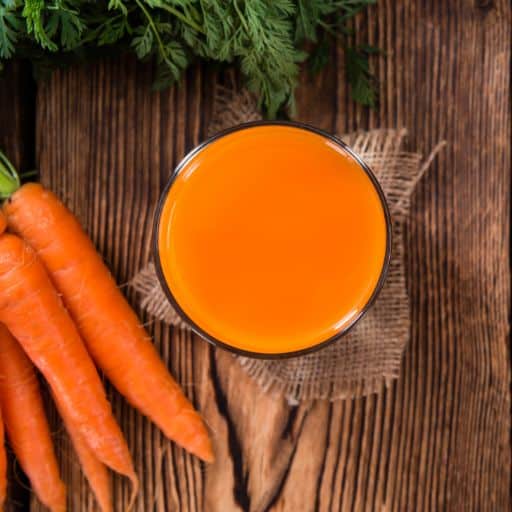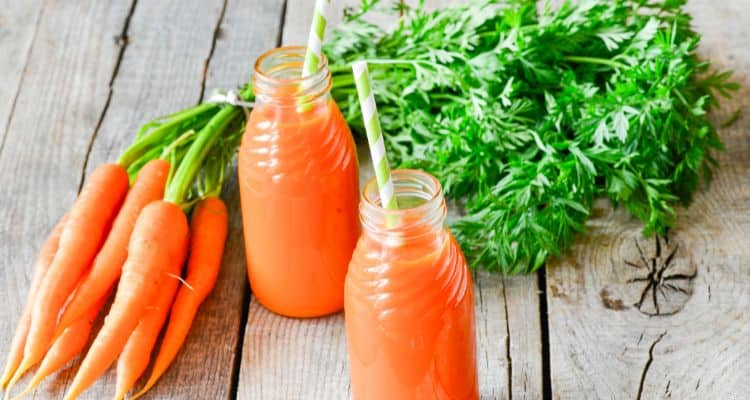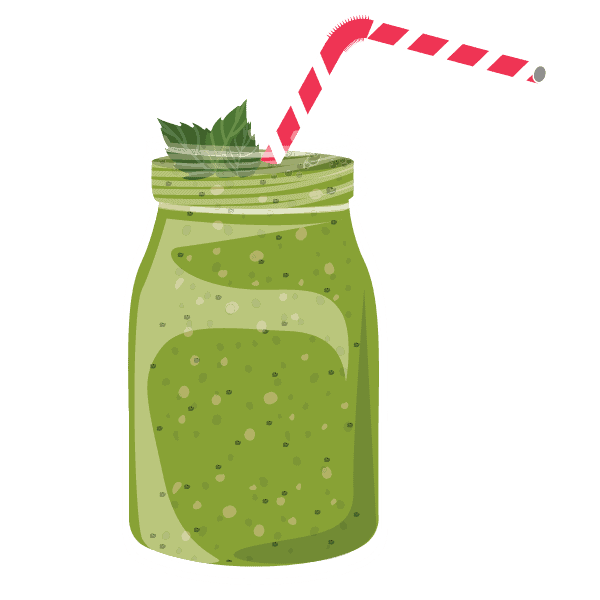Do you love drinking carrot juice? It’s a refreshing and healthy beverage packed with vitamins and antioxidants. But have you ever wondered how much carrot juice is safe to drink daily?
While carrot juice has many health benefits, it’s important to be aware of the potential risks of consuming too much. Drinking excessive amounts of carrot juice can lead to carotenemia, which causes the skin to turn yellow-orange. This happens because carrots are high in beta-carotene, a pigment that gives them their bright orange color.
According to nutrition experts, the recommended daily intake of carrot juice is 8 ounces or 1 cup. This amount provides all the nutritional benefits without risking any adverse effects.
However, if you’re tempted to drink more than one cup of carrot juice per day, there are some things you should keep in mind. Drinking more than 3 cups of carrot juice daily can increase the risk of developing kidney stones. This is because carrots are also high in oxalates, which can contribute to the formation of kidney stones in susceptible individuals.
It’s also worth noting that while vitamin A and beta-carotene are beneficial nutrients for good health, they can be toxic in large amounts. Overconsumption of these nutrients can cause symptoms such as nausea, dizziness, and even liver damage.
How Much Carrot Juice is Safe to Drink Daily

As per dietary guidelines, the recommended daily intake of carrot juice for optimal health is 4-8 ounces per day.
Regular consumption of carrot juice can help individuals meet their daily nutritional requirements and improve overall health.
What are the benefits of regular carrot juice consumption?
Regular consumption of carrot juice provides several essential nutrients, such as vitamin A, vitamin C, and potassium. Vitamin A is essential for maintaining healthy eyesight and skin, while potassium helps regulate blood pressure levels.
Drinking fresh carrot juice regularly may also boost immune function due to its high antioxidant content. Antioxidants protect the body against free radicals that can cause cellular damage leading to chronic diseases like cancer and heart disease.
How does regular carrot juice consumption fit into a healthy diet?
Carrot juice can be a healthy addition to a balanced diet when consumed in moderation per dietary guidelines. It is crucial to note that consuming only one type of food or beverage cannot provide all the nutrients the body requires; hence variety is key.
Incorporating fresh fruits and vegetables and other protein sources such as lean meats, fish, and legumes can help meet your daily nutritional requirements.
Drinking carrot juice alongside a balanced diet can provide additional nutrients that may be lacking in your regular meals.
When is the best time to drink carrot juice?
There is no specific time of day when it is best to drink carrot juice. However, some people prefer to consume it in the morning on an empty stomach or before meals.
Drinking carrot juice with meals may also aid digestion by promoting the production of digestive enzymes.
It is essential to note that consuming too much carrot juice on an empty stomach may cause nausea or other digestive issues. Therefore, starting with a small amount is best, and gradually increasing your intake over time while monitoring any adverse effects.
Benefits of Drinking Carrot Juice
One primary benefit of carrot juice is its high nutrient content. Carrots are an excellent source of vitamins A, C, K, and B6, potassium, and fiber. These nutrients are vital in maintaining healthy vision, skin, immune system function, and digestion.
In addition to its nutritional value, drinking carrot juice has been linked to several other health benefits. For example:
- Improved heart health: Studies have shown that regular consumption of carrot juice may help lower blood pressure and reduce the risk of heart disease.Cancer prevention: Some research suggests that compounds found in carrots may have anti-cancer properties.Better cognitive function: Carrots contain antioxidants that can help protect brain cells from damage caused by free radicals.
Improved heart health: Studies have shown that regular consumption of carrot juice may help lower blood pressure and reduce the risk of heart disease.
Cancer prevention: Some research suggests that compounds found in carrots may have anti-cancer properties.
Better cognitive function: Carrots contain antioxidants that can help protect brain cells from damage caused by free radicals.
The Risks of Drinking Too Much Carrot Juice
While moderate consumption of carrot juice is generally safe for most people, excessive intake can lead to certain risks.
One potential risk associated with drinking too much carrot juice is skin discoloration. This condition occurs when an individual’s skin turns yellow or orange due to excessive levels of beta-carotene in the body.
Another risk of consuming too much fruit juice – including carrot juice – is weight gain. Many fruit juices are high in sugar and calories, which can contribute to an unhealthy diet if consumed excessively.
Liver Damage
Carrot juice is an excellent source of vitamin A, a crucial nutrient in maintaining healthy vision, skin, and immune function. A single cup of carrot juice contains more than 500% of the daily recommended intake of vitamin A. However, consuming too much vitamin A can be toxic to the body, so limiting your intake is essential.
One 8oz cup (240 ml) of fresh carrot juice contains approximately 45,000 IU (international units) of vitamin A. This represents over five times the recommended daily intake for adults and children. However, it’s important to note that not all types of carrot juice contain the same amount of vitamin A. The nutritional value can vary depending on the age and variety of carrots used and how they were processed.
The recommended daily intake for vitamin A varies depending on age and gender. For adult men and women over 19 years old, the recommended daily allowance (RDA) is 900 mcg RAE (retinol activity equivalents), while children between 1-18 years old require less.
Infants under one year should receive around 400-500 mcg RAE daily. Concerning carrot juice, it is generally advised that adults consume no more than one cup per day due to its high vitamin A levels. I would not give carrot juice to children less than 2 years old without seeking medical advice first.
Who Should Avoid Drinking Carrot Juice?
While most people can safely consume moderate amounts of carrot juice without adverse effects, some should avoid it altogether. For example:
- People with kidney problems: Carrots are high in potassium, which can harm individuals with kidney disease or other kidney-related health conditions.Individuals taking certain medications: Some medications, such as blood thinners, may interact negatively with compounds in carrots and other fruits and vegetables.
- Individuals taking certain medications: Some medications, such as blood thinners, may interact negatively with compounds in carrots and other fruits and vegetables.
It is important to note that while drinking carrot juice can provide numerous health benefits, it should not be relied upon as a sole source of nutrition. A balanced diet that includes a variety of fruits, vegetables, whole grains, and lean proteins is essential for optimal health.
Improving Eye and Skin Health with Carrot Juice

Beta Carotene for Good Vision
Beta carotene is a type of carotenoid that gives carrots their orange color. It is also found in other fruits and vegetables, such as sweet potatoes, spinach, and kale. Beta carotene is converted into vitamin A in the body, which plays a crucial role in maintaining good vision.
In addition to beta-carotene, carrots also contain lutein and zeaxanthin. These antioxidants are found in high concentrations in the eye’s retina and may help protect against age-related macular degeneration (AMD) and cataracts.
One study showed that drinking 8 ounces of carrot juice daily for three months improved visual acuity in people with AMD. Another study found that consuming lutein-rich foods like carrots reduced the risk of cataracts by up to 40%.
Drinking carrot juice regularly can help improve eye health and prevent yellowing of the eyes. Yellowing of the eyes can be caused by various factors such as aging, smoking, or exposure to UV radiation. However, consuming foods rich in beta carotene, like carrot juice, can help reduce the risk of yellowing and maintain healthy eyesight.
Vitamin A and C for Healthy Skin
In addition to improving eye health, vitamin A in carrot juice also supports healthy skin by promoting cell growth and repair. Vitamin A helps keep skin soft, supple, and moisturized by supporting collagen production.
Collagen is a protein that provides structure to our skin cells. Our collagen production decreases as we age, leading to wrinkles and sagging skin. Consuming moderate amounts of carrot juice daily can boost collagen production leading to healthier-looking skin.
Some medical conditions, such as psoriasis, have been linked to low levels of beta-carotene. Drinking carrot juice regularly may help improve symptoms associated with this condition.
Other Vitamins and Minerals
Besides beta carotene and vitamin A, carrot juice contains other vitamins and minerals that benefit overall health. These include:
- Vitamin C: An antioxidant that protects against free radical damage.
- Potassium: Helps regulate blood pressure.
- Vitamin K: Important for blood clotting.
Consuming moderate amounts of carrot juice daily can be a great addition to a healthy diet for improving eye and skin health. However, it is important to note that excessive beta-carotene consumption can lead to carotenemia, which causes the skin to turn yellowish-orange. Therefore, it is essential to consume carrot juice in moderation.
Boosting Heart Health with Carrot Juice

Lower Blood Pressure
One of the significant benefits of carrot juice is its high potassium content. Potassium is a mineral that plays a vital role in regulating blood pressure levels. Several studies have shown that consuming potassium-rich foods help lower blood pressure levels and reduce the risk of heart disease.
Juicing carrots is an excellent way to increase your potassium intake since you consume more than you would typically eat in one sitting. When you juice carrots, you remove the fiber, making it easier for your body to absorb the nutrients quickly.
Potassium for Kidney Function
Potassium is an essential mineral that plays a vital role in kidney function. It helps regulate fluid balance, blood pressure, and electrolyte levels. Consuming too little potassium can increase the risk of kidney stones and other kidney problems.
Drinking carrot juice is a healthy way to add potassium to your diet. A cup of carrot juice contains about 500 mg of potassium. Adults’ recommended daily potassium intake is 2,000-3,500 mg daily.
Low Sugar Content
Carrot juice contains less sugar than fruit juices like apple or orange juice. One cup of carrot juice contains around nine grams of natural sugar compared to apple juice’s 24 grams per cup. This makes carrot juice an excellent option for those watching their blood sugar levels or trying to reduce their overall sugar intake.
Drinking carrot juice may help regulate insulin production due to its low glycemic index (GI) score. Foods with a low GI score release glucose into the bloodstream slower than high GI foods like candy or soda.
Good for Pancreatitis?
If you have pancreatitis, avoiding certain foods and drinks that may irritate your pancreas further is essential. While some fruits and vegetables are off-limits during acute pancreatitis flare-ups due to their high fiber content, others, like carrot juice, are safe to consume.
Carrots contain antioxidants called polyacetylenes that have anti-inflammatory properties. These antioxidants may help reduce inflammation and protect your pancreas from further damage. The high potassium content in carrot juice can help regulate blood pressure levels, which is essential for those with pancreatitis.
Strengthening Immune System with Carrot Juice

Rich in Antioxidants
Carrots are rich in antioxidants such as beta carotene, which helps protect cells from damage caused by free radicals. Free radicals are unstable molecules that can cause oxidative stress and contribute to chronic diseases such as cancer and heart disease. By drinking carrot juice, you can increase your intake of antioxidants and reduce your risk of developing these diseases.
Adding Ginger for Extra Boost
Adding ginger to your carrot juice can further boost your immune system and aid digestion. Ginger has anti-inflammatory properties that can help reduce inflammation, leading to a stronger immune system. It also contains compounds called gingerols and shogaols, which have been shown to have antimicrobial properties that can help fight off infections.
To make ginger-carrot juice, blend fresh ginger root with carrots in a juicer or blender. You can also add other ingredients like apples or oranges for added flavor.
Fighting Infections
The nutrients in carrot juice can help fight off infections and support the production of immune cells. Carrots contain vitamin C, which helps stimulate the production of white blood cells that fight infection. They also contain vitamin A, which helps regulate the immune system and prevent infections.
Drinking carrot juice regularly can increase your intake of these important nutrients and keep your immune system strong. It’s important to note that while carrot juice can benefit the immune system, it should not be used as a replacement for medical treatment.
How to Make Carrot Juice
Making carrot juice is simple and easy. All you need is a juicer or blender and some fresh carrots. Here’s how to make carrot juice:
- Wash your carrots. Cut off the tops and bottoms. Peel if desired.
- Cut them into small pieces (1-2 inch pieces work best).
- Using your preferred juicer for carrots, feed the carrots into the juicer.
- Drink immediately or store in the fridge in an airtight container for up to 72 hours.
You can add other ingredients like ginger, apples, oranges for added flavor.
Potential Side Effects of Drinking Too Much Carrot Juice

Skin Discoloration
Drinking high amounts of carrot juice can lead to skin discoloration. This condition is known as carotenemia, which occurs when the body has an excess buildup of beta-carotene.
Beta-carotene is a pigment in orange and yellow fruits and vegetables such as carrots, sweet potatoes, and pumpkins.
When you consume high amounts of beta-carotene-rich foods or drinks such as carrot juice daily, your body cannot process all the beta-carotene effectively.
The excess beta-carotene accumulates under the skin layers, leading to yellowish-orange discoloration on the palms and soles of your feet. Thankfully this condition is harmless and reversible by reducing the intake of beta-carotene-rich foods or drinks.
You need vitamin A every day. Kids need 300 to 700 μg, and adults need 700 to 900 μg. Eating normal food can give you enough.
Consuming too much vitamin A can lead to liver toxicity, liver injury, spleen enlargement, and permanent liver damage.
Digestive Issues
Negative effects of consuming too much carrot juice include digestive issues such as diarrhea and bloating.
Carrots are rich in fiber that helps promote bowel movements. While juicing removes most of the fiber, blending or pulpy juices may cause gastrointestinal discomfort due to the fiber’s bulkiness.
Carrot juice contains natural sugars that may trigger bloating or gas production in some people with sensitive stomachs. It’s essential to start drinking small amounts gradually before increasing your intake for better digestion.
Increased Risk of Kidney Stones
Adverse effects of excessive carrot juice may also include an increased risk of kidney stones. Carrots contain oxalates that bind with calcium during digestion, forming crystals that can accumulate in kidneys over time, leading to stone formation.
Therefore, individuals with a history of kidney stones should avoid consuming large amounts of oxalate-rich foods such as carrots or spinach without consulting their medical practitioner.
Drinking enough water can help flush out excess oxalates and prevent kidney stone formation.
Conclusion: Should I Drink Carrot Juice Everday?
According to experts, consuming up to 8 ounces (1 cup) of carrot juice everyday is considered safe. This amount provides a good balance between reaping the benefits and avoiding potential side effects.
To ensure that you’re getting the most out of your daily intake of carrot juice without overdoing it, we recommend consulting with a healthcare professional or registered dietitian who can assess your individual needs and make personalized recommendations.
In conclusion, incorporating moderate amounts of carrot juice into your diet can offer numerous health benefits. By keeping in mind the recommended daily intake and being mindful of potential side effects, you can enjoy all that this nutritious beverage has to offer. So go ahead and grab a glass – cheers to your health!
Citations:
Eisenhauer B, Natoli S, Liew G, Flood VM. Lutein and Zeaxanthin-Food Sources, Bioavailability and Dietary Variety in Age-Related Macular Degeneration Protection. Nutrients. 2017 Feb 9;9(2):120. doi: 10.3390/nu9020120. PMID: 28208784; PMCID: PMC5331551.
Khoo HE, Ng HS, Yap WS, Goh HJH, Yim HS. Nutrients for Prevention of Macular Degeneration and Eye-Related Diseases. Antioxidants (Basel). 2019 Apr 2;8(4):85. doi: 10.3390/antiox8040085. PMID: 30986936; PMCID: PMC6523787.
LiverTox: Clinical and Research Information on Drug-Induced Liver Injury [Internet]. Bethesda (MD): National Institute of Diabetes and Digestive and Kidney Diseases; 2012-. Vitamin A. [Updated 2020 Nov 4]. Available from: https://www.ncbi.nlm.nih.gov/books/NBK548165/


